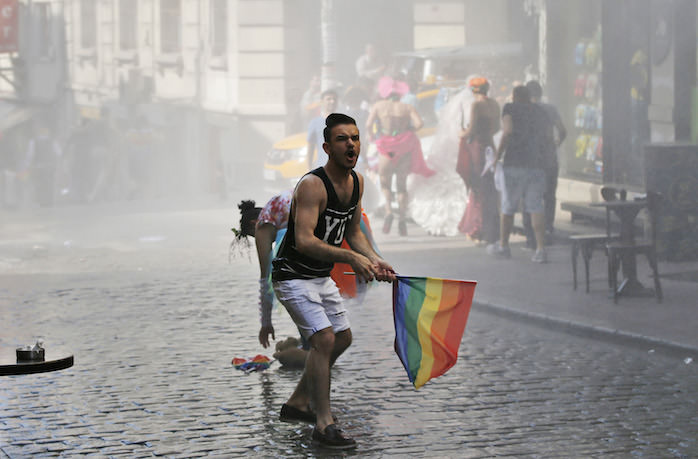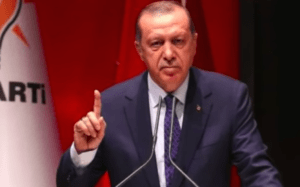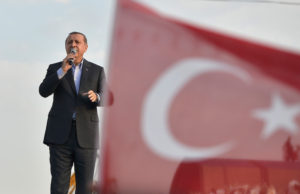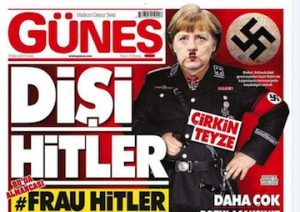The Truth Behind the Turkish Police Attack on Istanbul’s Gay Pride Parade
Did the heavy-handed police action signal a new culture war, or was it a form of revenge over the recent election results in which President Erdogan got less power than he’d expected? A participant in Istanbul's annual LGBT pride event reacts as others flee after Turkish police used water cannon to disperse them Sunday. (Emrah Gurel / AP)
A participant in Istanbul's annual LGBT pride event reacts as others flee after Turkish police used water cannon to disperse them Sunday. (Emrah Gurel / AP)
The annual gay pride parade in Istanbul began in 2003 with a few dozen marchers and grew in recent years to several thousand annually. On Sunday, however, the parade was attacked by police and prevented from proceeding. Was this move by the municipal branch of the ruling Justice and Development Party (AKP) a salvo in a new culture war that the center-right, religiously tinged party intends to fight? Or was it a petty, spiteful piece of revenge on a community that played a role in preventing it from getting a parliamentary majority?
On Sunday, police showed up with pepper spray, tear gas and water cannons and disrupted the march for reasons that remain murky. Probably, the police intervention against civil society was part of a general move by the AKP from a more pluralist to a more authoritarian model, under the influence of President Recep Tayyip Erdogan. The motive may also have been to prevent a nonreligious manifestation during the sacred fasting month of Ramadan. If so, the action was illegal under Turkey’s secular Constitution.
Police blocked all entrances to Istiklal Avenue, off Taksim Square, a traditional Bohemia and site of gay establishments, the route the marchers had planned to take. They injured marchers with rubber bullets and high-pressure water cannons, as well as appearing to fire military-grade tear gas canisters right into the crowds. One eyewitness alleged that one of the policemen shouted “Die, you faggots!”
The Justice and Development Party was thwarted in its quest for majority in Parliament in the recent elections, in part by the leftist pro-Kurdish Peoples’ Democratic Party (HDP), which took up the mantle of gay rights and put up an openly gay candidate, Baris Sulu. President Erdogan was scathing against gays during the campaign. It is possible that the HDP will introduce legislation authorizing gay marriage and more LGBT rights.
One of the secrets of HDP success, however, was that it stole votes from the ruling Justice and Development Party from religiously conservative Kurds, who voted on the basis of ethnic identity rather than on the platform of cultural conservatism. AKP may have decided to launch new culture wars in hopes of shoring up its rural, conservative base. Party leader Erdogan has gradually given up the pluralist rhetoric that brought his party to power in 2002 and later and increasingly has used Muslim fundamentalist diction. He also now advocates a model of elective dictatorship in which the public is to sit down and shut up and have input into social policy only at the ballot box, after which the elected politicians will monopolize power.
For Turkish cultural conservatives, the U.S. Supreme Court verdict on gay marriage last week may also have been alarming. Turkey wants to join the European Union, but the AKP does not want to capitulate on issues important to Muslim conservatism. Its party leaders know that the tide is turning on them on this issue internationally, and the assault on the parade may have been intended as a signal of defiance of an increasing consensus in the West, of which Turkey’s elites feel themselves a part.
A general fear of popular protest and direct democracy is also implicated in this crackdown. In June 2013, the AKP municipal government heavy-handedly repressed environmental protesters trying to save Gezi Park in Istanbul from being given over to a mall and mosque development project. Istanbul gays played an important part in the Gezi Park protests then and subsequently.
In Turkey, unlike in most Muslim-majority countries, homosexuality is not illegal. The Napoleonic Code of 1813 had decriminalized sex acts between consenting adults in much of Europe. It was adopted into the penal code of the Ottoman Empire in 1858 in that state’s age of modernizing reforms. The modern Turkish judiciary was important, however, to keeping gay sex legal. In Egypt, which also adopted the Napoleonic Code, judges in the past decade and a half have begun upholding persecution of gays by categorizing homosexuality as “debauchery,” which is prohibited by Egyptian statute. A 1988 ruling in Turkey also recognized the right of transsexuals to change their sex medically.
Sociologist Deniz Kandiyoti has argued that the project of Turkish modernism, which aimed at creating a European-style government and society in the place of the old Ottoman one from the early 1920s, involved the assertion of heterosexual patriarchy. That is, Turkish modernism adopted a marriage model of one man and one woman, with the man the head of the household. Although it is often noted that Turkey adopted an early 20th century Swiss constitution as its organic law, it is seldom realized that Switzerland was not good on women’s rights. Thus, despite their freedom in the law, gays in Turkey face de facto homophobia and discrimination, which is not prohibited. There is no gay marriage, so same-sex couples face all the challenges of an unrecognized union.
A 2006 survey conducted under the auspices of the LGBT Solidarity Association found that 83 percent of the 393 gay people in their sample said they were in the closet with regard to close family members, and a similar percentage of those in school hid their identity from schoolmates. About 40 percent made themselves take up a heterosexual relationship for cover, and 56 percent experienced negative feelings about their sexual orientation. Some 27 percent said they had been physically assaulted over their identity, and 87 percent said they had been socially bullied (cited in Ayça Gelgeç Bakacak and Pinar ?ktem, “Homosexuality in Turkey: Strategies for Managing Heterosexism,” Journal of Homosexuality Volume 61, Issue 6 (2014): 817-846). LambdaIstanbul was itself briefly closed in 2008 by a lower court decision that was reversed by the Supreme Court.
Did AKP officials conspire to make an object lesson out of Istanbul’s LGBT community for daring to try to mount a parade during Ramadan? Was this the opening salvo in a campaign to put cultural conservatism at the center of the Turkish political debate? If Turkey’s political parties cannot put together 51 percent of seats in Parliament and form a government soon, the country may have to go back to the polls. There would probably be a lower turnout if that happened. But if the AKP can whip up the support of its Anatolian base, it might not suffer as much from voter fatigue as the other parties. Erdogan wants a parliamentary majority so he can reshape the Constitution and turn the country toward a presidential system. Does his party believe that gay-bashing is the path to that unprecedented grasp of power?
Independent journalism is under threat and overshadowed by heavily funded mainstream media.
You can help level the playing field. Become a member.
Your tax-deductible contribution keeps us digging beneath the headlines to give you thought-provoking, investigative reporting and analysis that unearths what's really happening- without compromise.
Give today to support our courageous, independent journalists.




You need to be a supporter to comment.
There are currently no responses to this article.
Be the first to respond.